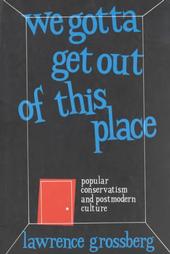We Gotta Get Out of This Place (book)
 We Gotta Get out of This Place: Popular Conservatism and Postmodern Culture book cover | |
| Author | Lawrence Grossberg |
|---|---|
| Publisher | Routledge. |
Publication date | 1992-05-21 |
| ISBN | 978-0-415-90330-1 |
| OCLC | 25025877 |
| 973.9 20 | |
| LC Class | E169.Z82 G757 1992 |
We Gotta Get out of This Place: Popular Conservatism and Postmodern Culture by Lawrence Grossberg was published in 1992 and deals with several aspects of (then) contemporary American culture: Lawrence Grossberg states that it is a book about “the political, economic and cultural forces which are producing a new atmosphere, a new kind of dissatisfaction and a new conservatism in American life”.[1] Further, he discusses how commercialization, a lack of passion, and depoliticization causes a new conservatism in rock. A critical review of the book calls it "a highly ambitious and intriguing work, if an ultimately flawed one."[2]
Introduction, “Rock under siege”
Lawrence Grossberg explains that the rising number of attacks on rock music only show the Right’s ambiguous relationship to popular culture.
Attacks on rock music are usually produced by Christian fundamentalist movements and an “elitist fraction of a new conservative alliance”, who see rock as the main cause for “a certain fall from grace”.[3]
The Increasing Commodification of Rock Music
Grossberg distinguishes between more organic forms of rock music, which sometimes characterize the 1960s, for example, and those of the 1980s, whose texts were highly choreographed by the culture industry (record labels, MTV, music magazines, etc.).
Conservative Appropriation of Rock Music
For Grossberg, the Reagan and Thatcher revival of conservatism can be understood in terms outlined by Antonio Gramsci. A popular hegemony sought to defang the critiques of the counterculture and reinscribe youth culture in the service of corporate capitalism.
On the surface, this form does not resemble an attack but it uses rock music and reconstructs its meanings and significance. Thus, conservative Christian groups can use rock in order to spread their “fundamentalist and conservative messages”.[4]
Grossberg further states that these attacks on rock are actually quite paradoxical, as rock has become “part of a dominant mainstream culture”[5] and thus, “rock is losing power to encapsulate and articulate resistance and opposition””.[5] According to Grossberg, however, the new conservatives try to regulate the “possibilities of pleasure and identity as the basis opposition and to dismantle the cultural and political field constructed in the 1960s".[6]
Professor Michael Gardiner writes, "According to Grossberg, the major consequence of this is that politics in present-day America has become curiously depoliticized. Strictly economic or ideological arguments in favour of the conservative agenda have been replaced by appeals to mood, passion, sentimentality, and so on." Gardiner's review continues: "Yet, at the same time, daily life is repoliticized: the new conservatism seeks to take over the spaces and places within everyday life formerly occupied by youth culture (the body, pleasure/fun, youth) and invest them with new values and meanings. The overarching goal is to submit the practices of daily life to an apparatus of power that is more congenial to the requirements of the emerging post-Fordist economic order. One result is that politics has become largely personalized, just another "lifestyle choice," rather than a site of collective struggle in which popular culture used to play a crucial role:"[2]
Gardiner then quotes Grossberg, "The collapse of all political space, civil society and everyday life and the transformation of everyday life in disciplined mobilization not only depoliticizes large segments of the population, it also eviscerates the recognition of popular culture as a terrain and weapon of struggle." [7]
Sloppy writing and editing
This article possibly contains original research. (April 2016) |
This article's tone or style may not reflect the encyclopedic tone used on Wikipedia. (April 2016) |
It should be noted that We Gotta Get out of This Place, as is the case with much of Grossberg's writing, is rife with misspellings of names of everyone from rock stars and TV actors to other critics of popular culture. This may simply irritate some readers more than others, but it can also cause a lack of reader comprehension or even mislead him. For example:
- Tony Bennet should of course be Bennett
- Allen Bloom, Allan
- Pat Buchanon, Buchanan
- Bobby Darren, Darin
- Pee Wee Herman, Pee-wee
- Lincoln Monument, Lincoln Memorial
- Hans Solo, Han Solo
- Winnie Mandella, Mandela
- Volkswagon, Volkswagen
Many of the imprecise titles simply have troubles with articles, "phonics," or excessive breeziness, but other errors are more substantial:
- Big Chill should be The Big Chill
- Close Encounters, Close Encounters of the Third Kind
- Deerhunter, The Deer Hunter
- Emergency, Emergency!
- ET, E.T. the Extraterrestrial
- Fast Times at Ridgement High, Ridgemont
- Mash and MASH, should be M*A*S*H
- Nik at Nite, Nick at Nite (now nick@nite; also, this is a network, or channel, so it shouldn't be ital like a show)
- thirty something and Thirtysomething, should be thirtysomething
- Unsolved Crimes, Unsolved Mysteries
Grossberg also makes incomplete allusions that have no precedent and are never fleshed out. Many of them cannot be assumed to be understood by the reader, especially decades after publication:
- Crocket, probably Sonny Crockett (Miami Vice character)
- Khadafi
- Noriega
Citations are all over the map, with great inconsistency even in references to the same source. Also, the chapter titles, running heads, and titles in the note section don't match.
Notes
- ^ Grossberg (1992) 2
- ^ a b Gardiner, Michael Rockin' at the White House Memorial University of Newfoundland
- ^ Grossberg (1992) 5
- ^ Grossberg (1992) 8
- ^ a b Grossberg (1992) 9
- ^ Grossberg (1992) 10
- ^ 'Grossberg (1992) 308
Bibliography
- Grossberg, Lawrence We Gotta Get out of This Place: Popular Conservatism and Postmodern Culture Routledge. 1992-05-21 ISBN 978-0-415-90330-1.
